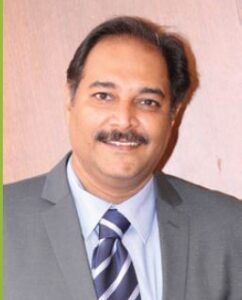It was that time of the year in Benaras when the Sankat Mochan Hanuman Temple was fully decorated with marigold flowers. It was the time of the annual Sankat Mochan Sangeet Samaroh, the Music festival which all of Benaras and several connoisseurs of music the world over were eagerly looking forward to. It was a celebration of Indian Classical Music and Dance. Once a year, Music Maestros and Divine Dancers would ascend upon Benaras and transform this holy city into a cosmic entity.
The Sangeet Samaroh was in its 50th year. It was a 7-day music festival. It would start as early as 5.00 am and would continue until the end of the day. Sometimes, the performers and the crowd would be so involved in the music that the performance would continue a straight 24 hours, without a break! Music and Dance legends had been performing here since it began. Ustad Bismillah Khan playing the Shehnai, Pandit Ravi Shankar playing his Sitar, Pandit Birju Maharaj and Dr. Rohini Bhate performing Kathak, the jugalbandi between Pandit Shiv Kumar Sharma and Ustad Zakir Hussain; the vocals of Pandit Bhimsen Joshi, Dr. Balamuralikrishna, M.S. Subbbulakshmi; the who is who of Indian Classical Music and Dance had performed here. It was said that if an artist was asked to perform at the Sangeet Samaroh, he had “arrived” in the truest sense of the word.
Benaras too had its gems who would perform at the Sangeet Samaroh. Apart from Ustad Bismillah Khan, vocalists Girija Devi and Allauddin Khan, tabla maestros Kishan Maharaj and Samta Prasad, etc., had been performing at the Samaroh.
In the past few years, Ustad Rashid Khan had emerged as the finest Hindustani Classical vocalist in the country. Born and brought up in Benaras, he had learned music from another great vocalist, Pandit Ram Narayan Sharma. Ustad Rashid Khan honed his craft diligently over the years, and this led to the greatness which he had achieved. Ustad Rashid Khan, now at the age of 60, was the current patron of the Sangeet Samaroh. He would send out official invites to all the other greats each year.
In addition to the legendary singers, musicians, and dancers, the Samaroh would also offer a chance to upcoming musicians to display their art form. As per the tradition, each day, an upcoming young artist would perform first, and the performances of other seasoned artists would follow this. The crowd attending the Samaroh was exceptionally well educated in the nuances of classical music and dance. Their reaction was the instant barometer for measuring the performance of the artist.
On the last day of the Samaroh, the patron of the Samaroh would perform. This session would be packed to the brim. The entire crowd and the other participants and performers of the Samaroh would be there to listen to the patron. As was the practice, the session would start with a young artist performing, and after this performance, the patron of the Samaroh would start his performance, which would be the grand finale.
Ustad Rashid Khan, Ustadji, as all lovingly knew him, was a very humble man. He was married to Khatija, who was a devoted wife to him. He had two sons, and both were married. Ustadji also taught classical music to many young students. He would not take any fees for teaching music. “God has given me a lot. My music is a gift from Maa Saraswati to me. How can I charge for this gift?” he would say. Whenever the name of a senior musician was taken in Ustadji’s presence, he would immediately touch his ear as a mark of respect. Many American and European Universities had invited him to teach Hindustani Classical Music. He would travel for performances, but never did he agree for a permanent teaching position. “I won’t be able to get the hot jalebis in America, which I get to eat on the banks of the river Ganga,” he said. Ustadji, though a purely Hindustani classical singer, would also listen to Hindi film songs. These songs were generally looked down upon by the classical singers, but Ustadji was different. He respected music in all its forms. His personal favorite was “Man Tarpat Hari Darshan Ko Aaj” from the movie Baiju Bawra, sung by Mohammed Rafi. One could hear him humming this song most of the time.
Ustadji’s students were a bunch of boisterous kids. Some were as young as six years old, and the senior full-time students were in their mid and late twenties. Ustadji would teach them with a lot of patience and care. These students also would keep Ustadji updated on the local music scene in Benaras. These students were also helping Ustadji in the organization and management of the Samaroh. Ustadji wanted a fresh artist for the last day’s performance, and one of his students, Tareq Sheikh, recommended a singer by the name of Shashikant Mishra. “Ustadji, he is really very good. He trains under Farahat Khan and can sing both Thumris and Khayaals with equal ease. His Bandish’s (compositions) are different Ustadji. You wouldn’t have heard the kind of compositions he can come up with. He is dying to perform at the Samaroh. Listen to him once, Ustadji. You will really like him. I can tell you; he is better than anyone we have in our group of students. Ask anyone about Shashikant, Ustadji. You know his Guru, Farhat Khan Sahab. You can talk to him, Ustadji. His performance before yours and then you sing the finale would be a gift from the Gods, Ustadji,” said Tareq.
This was high praise indeed. Tareq himself was an accomplished vocalist, and here he was, praising another vocalist. Asking Farhat Khan Sahab about his student Shashikant would tantamount to insulting the Guru. Ustadji would never do that. Moreover, Farhat Khan Sahab was out of the station, attending to a medical emergency in the family. Ustadji had a personal liking for Thumris and was intrigued. “Tell me more about him, Tareq,” said Ustadji. “He is my age Ustadji. About 25 years old. He stays very near to our house. We have been friends since childhood, and we often do our riyaaz together. He has so many questions about you, Ustadji. He has been learning music since the age of 7 from Farhat Khan Sahab. You know Ustadji, Farhat Khan Sahab is a master of Thumris. Shashikant is the backup vocalist for Farhat Khan Sahab’s performances. Khan Sahab, in many mehfils, has made Shashikant sing solo. Listen to him, my student; he will leave me far behind, Khan Sahab would say. Ustadji, please let him perform at the Samaroh,” pleaded Tareq.
Ustadji decided to take a chance with Shashikant. He sent an invitation to Shashikant, through Tareq, to perform at the samaroh. Shashikant was to perform for about an hour, at about 6.00 pm. Ustadji was to start his performance at about 7.00 pm. Ustadji did his riyaz for about an hour and then proceeded to the Samaroh venue. Shashikant took the stage. Ustadji was sitting right at the front. Seeing Ustadji, Shashikant immediately touched his ears as a mark of respect. Ustadji nodded back, noting Shashikant’s gesture. Shashikant sat down, adjusted the microphone, had a brief conversation with his musicians, and then spoke, “Today, I have got the opportunity to perform in the presence of legends. I do not know if I am worthy of such an honor. I do know, however, that I have been taught very well by my Guruji, Ustad Farhat Khan Sahab. Whether I have been a good student or not will be proved today. I wish my Guruji were here today to witness this”.
Ustadji was stunned by these words. Here was a boy on the verge of his first significant performance, paying such huge respect to his teacher. Shashaikant had impressed Ustadji with his humility and modesty. He then looked at Ustadji and asked, “Do you want me to sing something to your liking Ustadji?”.
“Start with a thumri, my son,” replied Ustadji.
Shashikant started with an extremely celebrated Thumri “Shubh Din Aayo..” originally sung by Ustad Bade Ghulam Ali Khan. His voice was melodious, and he held on to the original tune of the Thumri for the first 15 minutes. Gradually Shashikant brought his own “Bandish” (composition) into the Thumri, and the result was sheer magic. The entire audience was enchanted. They were transported into another world. Ustadji, too was fascinated. He knew he was witnessing an ethereal performance. Ustadji closed his eyes and completely immersed himself in the singing. Shashikant also was wholly absorbed in his singing and was conjuring one magical moment after another.
Ustadji felt someone nudge him, and he opened his eyes. He could hear the entire audience give thunderous applause to Shashikant, who, with folded hands, was humbly accepting these compliments. Ustadji did not even realize when the performance was over. He checked his watch and saw that Shashikant had been singing for nearly an hour. Ustadji had never come across such brilliant singing in the recent past. Shashikant had taken the entire audience to another world. It was divine singing.
Shashikant then stood up, and Ustadji made way to the stage. When Ustadji got on to the stage, Shashikant bowed down and touched Ustadji’s feet. Ustadji blessed Shashikant and asked him to wait on the stage itself. Ustadji then took the microphone. “Very few times in life do we get to witness such performances. Shashikant, I would like to say here that Ustad Farhat Khan Sahab has not only taught you very well, but you have also been an able student. Just as you are lucky to find Farhat Khan Sahab as a teacher, we are lucky to listen to you. I have been singing all my life. I have sung in front of different audiences and have also witnessed Maestros performing. I can understand when the audience wants a singer to stop and when they want to have more of him. Today, I know for sure that they want you to continue singing. Not only they Shashikant, but I also want you to continue singing today. I will not defile the sanctity of your performance with my singing today. As the patron of the Samaroh, I, at this moment, announce that the Samaroh be extended by a day, and I shall sing for all of you tomorrow. Not today. Today, I, along with all of you, would like to take in Shashikant’s performance”. The audience was stunned into silence. Never before in the 50- year history of the Sangeet Samaroh had it been extended by a day. However, the silence turned into rapturous applause after Ustadji’s announcement.
Ustadji asked Shashikant to continue singing and returned to his seat in the audience. The year 2020 is the only year in which the Sankat Mochan Sangeet Samaroh was extended by a day.
(Note: The above short-story is from the collection Tales from Talegaon and Other Short Stories )
About the Author

Born in Bombay, Hemu, as he likes to be called, shifted with his family to Talegaon Dabhade, a small town near Pune in 1982. He was 15 then. Talegaon is his home. He always says one can take a man out of Talegaon, but one can’t take Talegaon out of the man!
Reading is a habit which he inherited from his parents and grandparents. Hemu has been an avid cricketer & continues to be a mentor to young people. He believes in doing different things to explore his potential fully. Hemu dabbles in writing, teaching, painting, the stock market and is developing an interest in religion, meditation, Urdu language and poetry, Sufism & faith. His mantra being, a life explored is a life lived. Based in Saudi Arabia, Hemu works very hard to earn a living















